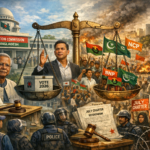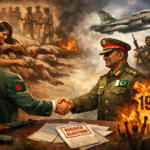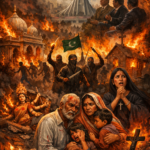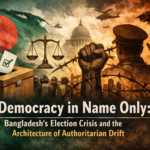Introduction: The treatment of the Uyghur Muslim population in China has garnered international attention and sparked widespread concern over human rights violations. Reports and testimonies suggest that the Chinese government has engaged in many appalling actions against the Uyghur community. This essay explores the treatment of Uyghur Muslims in China, examining the policies implemented, the alleged abuses, and the international response to this issue.
Background and Policies: The Uyghurs are a predominantly Muslim ethnic group residing in China’s Xinjiang Uyghur Autonomous Region. The Chinese government has implemented policies restricting the Uyghur population’s religious and cultural practices. These policies include strict surveillance, arbitrary detentions, forced labour, mass internment camps, and the suppression of religious freedom.
Appalling Abuses: Numerous reports, including those from human rights organisations, leaked Chinese government documents, and testimonies from former detainees, indicate a range of awful abuses against the Uyghur Muslims. Detainees in internment camps are subjected to forced labour, psychological and physical torture, sexual abuse, and moved assimilation programs to eradicate their religious and cultural identity.
Surveillance and Control: China has implemented a sophisticated surveillance system in the Xinjiang region, with pervasive monitoring through facial recognition technology, CCTV cameras, and mass data collection. Uyghur Muslims are subjected to constant surveillance, scrutinising their every move, communication, and religious activity. This surveillance apparatus infringes upon the Uyghurs’ right to privacy and freedom of expression.
Forced Labour and Internment Camps: The Chinese government has been accused of using forced labour, with Uyghur detainees being forced to work in factories producing goods for global supply chains. Reports suggest that over a million Uyghur Muslims have been detained in internment camps, euphemistically called “reeducation centers.” Overcrowding, unsanitary conditions, and severe restrictions on personal freedom characterise these camps.
Religious Suppression: Religious freedom is severely curtailed in the Xinjiang region. Mosques have been demolished or repurposed, and Uyghur Muslims are prohibited from practising their faith freely. Reports suggest that the Chinese government has destroyed Islamic religious sites and cultural heritage, erasing the rich history of Uyghur Muslims.
International Response: The international community has raised concerns over China’s treatment of the Uyghur Muslim population. Some countries have condemned these actions, while others have imposed sanctions on Chinese officials responsible for the abuses. However, a coordinated global response to address the issue effectively has been challenging due to political and economic considerations.
In addition to the Chinese government’s appalling treatment of the Uyghur Muslim population, the Uyghurs have also expressed a desire for self-determination and establishing an independent homeland. This essay explores the Uyghurs’ aspirations for independence from China, examining the historical context, the factors driving their rebellion, and the implications for the ongoing human rights crisis.
Historical Context: The Uyghurs have a long history of cultural and ethnic identity in the Xinjiang region. They have experienced various periods of independence and self-rule throughout history. However, since the establishment of the People’s Republic of China in 1949, the Chinese government has sought to control the region, leading to growing discontent among the Uyghur population.
Factors Driving Rebellion: The Chinese government’s appalling treatment of the Uyghur Muslims has significantly fueled the Uyghurs’ desire for independence. The policies of religious and cultural suppression forced assimilation, and mass internment have instilled a sense of injustice and a longing for autonomy among the Uyghur community.
Furthermore, economic marginalisation and demographic changes in the region have contributed to the Uyghurs’ sense of disenfranchisement. The influx of Han Chinese migrants and prioritising the Chinese language and culture have heightened tensions and deepened the Uyghurs’ desire to reclaim their identity and establish their homeland.
Implications and Challenges: The Uyghurs’ quest for an independent homeland poses significant challenges and impacts. The Chinese government, committed to maintaining territorial integrity, considers any attempts at separatism as a threat to national security. As a result, it has responded to Uyghur aspirations with increased repression and control, further exacerbating the human rights crisis in the region.
The international community faces a complex dilemma in addressing the Uyghurs’ quest for independence. While many nations value the principles of self-determination and human rights, they also acknowledge China’s geopolitical significance and economic influence. Balancing these interests has often hindered a unified and decisive international response to the Uyghur crisis.
The Way Forward: Resolving the Uyghur crisis requires a comprehensive approach that addresses both the human rights abuses and the aspirations for self-determination. Dialogue and negotiations between the Chinese government and Uyghur representatives are essential to finding a peaceful and sustainable resolution.
The international community should continue to apply diplomatic pressure on China, urging it to uphold human rights, allow independent investigations into the treatment of Uyghur Muslims, and engage in meaningful dialogue with Uyghur leaders. Economic sanctions and targeted measures can hold Chinese officials accountable for their actions and create incentives for change.
Conclusion: The Chinese government’s treatment of the Uyghur Muslim population is a matter of grave concern. The alleged human rights abuses, including mass internment, forced labour, and religious suppression, are appalling and contradict fundamental human dignity and freedom principles. The international community must work together to address this issue, hold the responsible parties accountable, and ensure that the rights and well-being of the Uyghur Muslims are protected.
The Chinese government’s appalling treatment of the Uyghur Muslims has not only resulted in a dire human rights crisis but has also fueled the Uyghurs’ aspirations for independence and the establishment of their homeland. Addressing the Uyghur crisis necessitates a multifaceted approach that includes efforts to protect human rights, support dialogue, and promote peaceful resolution. It is crucial for the international community to actively engage in finding a just and sustainable solution that respects the Uyghurs’ rights and aspirations while considering the complex geopolitical dynamics at play.
References:
- Amnesty International. (2021). ‘Like We Were Enemies in a War’: China’s Mass Internment, Torture, and Persecution of Muslims in Xinjiang. Retrieved from https://www.amnesty.org/en/documents/asa17/4638/2021/en/
- Human Rights Watch. (2021). China’s Algorithms of Repression: Reverse Engineering a Xinjiang Police Mass Surveillance App. Retrieved from https://www.hrw.org/report/2021/03/12/chinas-algorithms-repression/reverse-engineering-xinjiang-police-mass-surveillance






